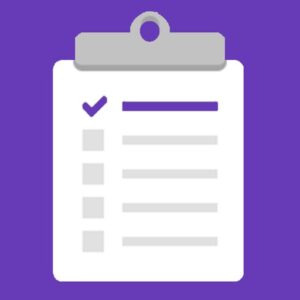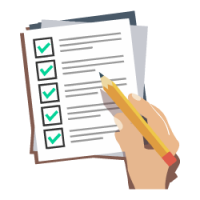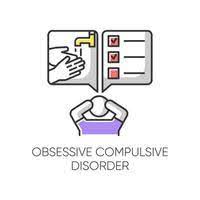The Yale-Brown Obsessive Compulsive Scale (Y-BOCS) is a tool used by mental health professionals to measure the severity of obsessive-compulsive disorder symptoms. It is also used to assess the effectiveness of treatment interventions. In this blog post, we will take an in-depth look at the Y-BOCS and discuss its use in diagnosing and treating OCD.
Contents
Defining Y-BOCS

Y-BOCS, a popular acronym for Yale-Brown Obsessive Compulsive Scale is a clinician-administered scale that is primarily used to diagnose and assess OCD, or obsessive compulsive disorder.
The Y-BOCS was developed in the mid-1980s by Dr. Ralph Greenson and Dr. Abramson at Yale University School of Medicine and Brown University School of Medicine, respectively. It was designed to be a more sensitive and specific measure of OCD symptoms than the then-existing scales. It has been found to have excellent inter-rater reliability, validity, and sensitivity.
The scale consists of two subscales: obsessions and compulsions. Each item is rated on a 0-5 for each question. There are a total of 10 questions.
The obsessions subscale assesses the intensity, time spent, and interference of obsessions. The compulsions subscale assesses the frequency, duration, resistance, and control of compulsions. A total score is calculated by summing the scores on each of the ten items. The Y-BOCS has a range of 0-40, with higher scores indicating more severe OCD symptoms.
The Y-BOCS has been found to be a reliable and valid measure of OCD severity. It is sensitive to change and is used to assess the efficacy of treatment interventions. This is a widely used tool in research and clinical practice and is considered the gold standard measure of OCD severity. It is also used to study the nature and course of OCD, as well as to develop and test new treatments.
Symptom Checklist

As we already learned, the test has two components: obsessions and compulsions. Both of these are further divided into subcategories and divisions. The symptom checklist refers to the first group of questions, in which the test-taker is asked about their obsessions. These obsessions include:
- Aggressive obsessions
- Contamination obsessions
- Sexual obsessions
- Hoarding obsessions
- Religious obsessions
- Symmetry obsessions
- Miscellaneous obsessions
Similarly, there are subcategories within the compulsions section. These compulsions include:
- Checking compulsions
- Washing and cleaning compulsions
- Counting compulsions
- Repeating compulsions
- Hoarding compulsions
- Miscellaneous compulsions
All of these contain the same general idea: that the person has a certain thought or feeling and then feels compelled to do something in order to alleviate that feeling. The scale is designed to measure the intensity, frequency, and duration of these obsessions and compulsions.
Questions
There are typically only 10 questions, 5 for obsessions and another five for compulsions. The questions will ask about the severity of symptoms and how much they interfere with daily activities. Answering these questions truthfully is important, as it provides valuable information to mental health professionals about the state of your OCD.
Scoring And Interpretation
The scoring of the Y-BOCS is based on a 0-40.
The scale has good reliability, validity, and sensitivity. It is also easy to use and only takes about ten minutes to administer. The Y-BOCS can be self-administered or completed by a clinician.
A score of 0-12 is considered mild OCD, 13-24 is moderate OCD, and 25-40 is severe OCD. The Y-BOCS has good discriminant validity, meaning it can accurately differentiate between mild, moderate, and severe OCD. It is also sensitive to change, meaning it can detect changes in symptoms over time.
The Y-BOCS is a valuable tool for diagnosing and treating OCD. It is a widely used, reliable, and valid measure of OCD severity.
Who Can Administer?
The test is usually administered by mental health professionals. This is because they have the necessary training and experience to properly interpret the results. However, the Y-BOCS can also be self-administered. Some of the professionals who can assess and administer the Y-BOCS include:

- Psychiatrists: They are medical doctors who specialize in mental health. They can diagnose and treat mental disorders, including OCD.
- Psychologists: They are experts in human behavior. They can provide counseling and therapy to help people with OCD.
- Clinical social workers: They can provide counseling, support, and advocacy to people with OCD and their families.
- Mental health counselors: They can provide counseling, therapy, and support to people with OCD.
- Marriage and family therapists: These are the professionals who can provide counseling and therapy to couples and families affected by OCD.
- Occupational therapists: They can help people with OCD learn new skills and also work on assessing and evaluating symptoms.
The Y-BOCS can be used to assess OCD symptoms at any time point. It is often used to diagnose OCD, track the severity of symptoms over time, and assess the efficacy of treatment interventions.
The Y-BOCS can be self-administered or completed by a clinician. If you are completing the scale yourself, it is important to read each question carefully and answer honestly. Remember, there are no right or wrong answers, so just go with your gut instinct.
What To Expect?
If you suspect that you might have OCD, it is important to seek professional help. A mental health professional can administer the Y-BOCS and provide you with a diagnosis. During the process, you can expect the mental health professional to ask you questions about your symptoms and how they interfere with your life. They will also ask you about any compulsions that you feel the need to perform. Be honest in your answers, as this will help the mental health professional get an accurate picture of your OCD severity. The test is a 5-minute read, and you will be asked to answer questions about obsessions and compulsions.
After the Y-BOCS is administered, the mental health professional will score it. The score will be used to determine the severity of your OCD and create a treatment plan accordingly. If you are self-administering the test, there is an answer key at the back of the scale that you can use to score it yourself.
If you are diagnosed with OCD, there are many treatment options available. Treatment usually consists of cognitive-behavioral therapy and/or medication. With proper treatment, most people with OCD can live normal, productive lives.
Conclusion
Conclusively, we can determine that the Yale-Brown Obsessive Compulsive Scale is an effective way of diagnosing OCD. It is also a useful tool for tracking the severity of symptoms and assessing the efficacy of treatment interventions. If you think you might have OCD, seek professional help to get a proper diagnosis. With proper treatment, most people with OCD can manage and understand themselves better.
If you are struggling with OCD, know that you are not alone. There are many resources available to help you cope with this condition. Reach out to Therapy Mantra for help getting started on the road to recovery. We have a team of mental health professionals who specialize in treating OCD. Our specialists can help you develop a treatment plan that meets your specific needs. Contact us today to book an online therapy or download our free OCD treatment app on Android or iOS for more information.


